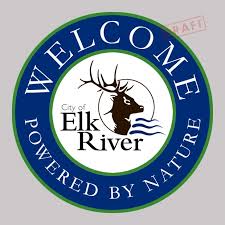City slogans: If you brand it, will they come?

By Tom Steward | Watchdog Minnesota Bureau
POWERED BY NATURE AND TAXPAYERS: Elk River, MN officials say a new logo, tagline, website and branding make a difference in how outsiders perceive the city.
COLUMBIA HEIGHTS, Minn. — If you brand it, will they come?
The clients may not be on the Fortune 500 list, but PR firms find more local governments want to build a “brand,” distinguishing themselves from other communities to attract businesses and residents.
Minnesota cities from Eden Prairie to Austin and Faribault to Anoka, along with several more in between, have bought into the “community branding” craze.
Brooklyn Park recently committed $150,000 to retain Carmichael Lynch Spong — a creative agency better known for hyping Harley-Davidson motorcyles than suburbs — to revamp what officials consider an undeserved bad rap from outsiders.
“Crime rate is at a 20-year low in Brooklyn Park. A recent survey of residents shows a large majority of you love living here. And businesses are moving their corporate campuses to our city in greater numbers. Despite all of this positive news, perceptions don’t align with reality, especially among those living and working outside Brooklyn Park,” states a promotional blurb on the city website.
Nearby Columbia Heights voted to embark on its own public relations makeover, awarding a $30,000 contract to a Minneapolis boutique firm to “rebrand” its dated image. While no Tony the Tiger or Geico gecko will likely emerge from the process, the campaign will involve local focus groups in developing a distinctive city logo, tagline and video, among other things.
“We really want to focus on highlighting some of the things we’re already doing and updating our branding, our website, our logo, our social media outreach, our forms for the city, things like that,” said Joseph Hogeboom, community development director for Columbia Heights.
While corporations spend millions on branding and advertising campaigns, cities budget far less to become the local government equivalent of Frosted Flakes, Twinkies or Ikea. Still, marketing campaigns generally supported with taxpayer money from economic development budgets often bring questions and concerns.
“I would be willing to bet that one of the recommendations that will come from the initial study will be to expand the program and spend more,” said Bruce Nawrocki, the sole City Council member to oppose rebranding. “But even the $30,000, I kind of question what we’re getting for it.”
In considering a similar proposal, the city of Monticello’s economic development staff noted that “71 (percent) of site selectors choose a location for their next business based off of brand and image … But what is Monticello’s brand? What is Monticello’s image? What do people say about Monticello ‘behind our back?’ What image do we portray to the ‘outside’ world?”
Some council members had another question: Why can’t city staff promote Monticello’s name and image rather than pay $30,000 to a consultant unfamiliar with the community? City officials ultimately rejected the marketing plan in 2012, amid concerns that “some of these cities that have done these projects haven’t necessarily benefited that greatly from introducing a new image,” according to council minutes.
So does “Powered by Nature” bring a Twin Cities community to mind?
“There’s so many ways to take this brand. It’s we’re powered by the people, we’re powered by the nature of the parks around us because we have 44 parks, so we’re very outdoorsy,” said RaeAnn Gardner, communications coordinator for the city of Elk River.
“Powered by Nature” began appearing on Elk River’s water towers, signs, website and city communications three years ago. City leaders believe the $37,500 campaign made a difference, but it’s difficult to quantify. A highlight was the Hockey Day Minnesota 2014 celebration, which incorporated the brand into a regionally televised event.
“One of the goals was to push this out in the community and for them to embrace it, too, the brand, for it’s not just to be a city brand but a community brand,” said Gardner. “So we have several businesses that have picked it up and used it in their marketing materials and then combining it with some of our featured events downtown.”
Yet campaigns can backfire, even one evoking a locally produced iconic brand like Spam. The city of Austin’s new “Talent Packed” tagline and logo reminiscent of a can of Spam provoked a local backlash and scathing editorial this spring in the Austin Daily Herald.
“The logo project cost about $60,000, but it’s unclear how much of that money went to Haberman and firms outside Austin. We agree with the logo in believing Austin is ‘talent packed.’ That’s why the money should have stayed in Austin,” stated the editorial.
Rebranding also hit the wall in Mounds View. After receiving more than 100 suggested taglines, Mounds View officials in 2009 settled on “See for Yourself.” The suggested slogan, however, rubbed many residents the wrong way, according to news reports. The City Council postponed adoption of the new tagline, so the old slogan — “Pride, Progress, Partnerships” — remains today.
Contact Tom Steward at tsteward@watchdog.org







